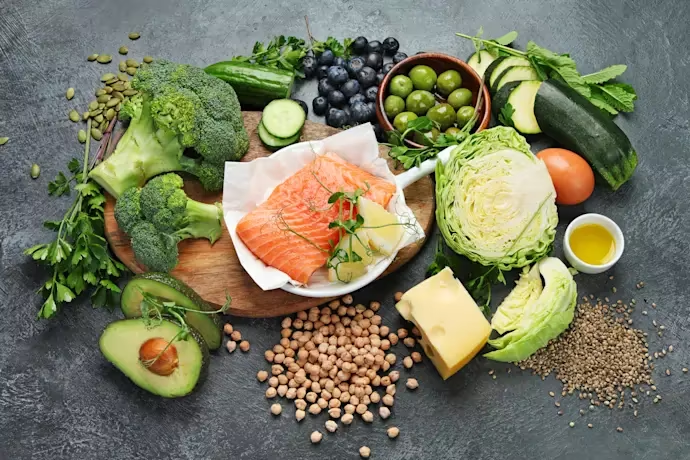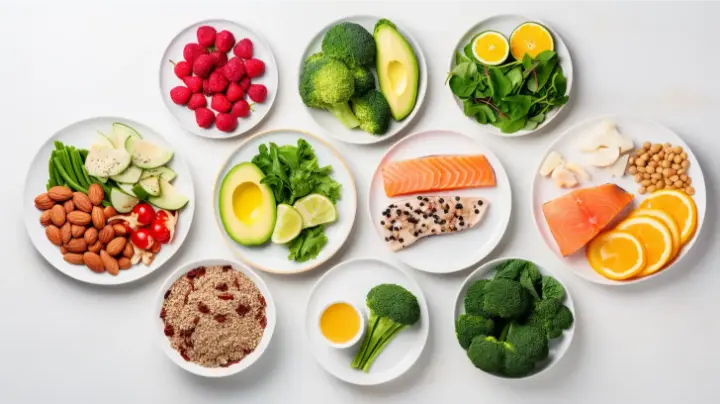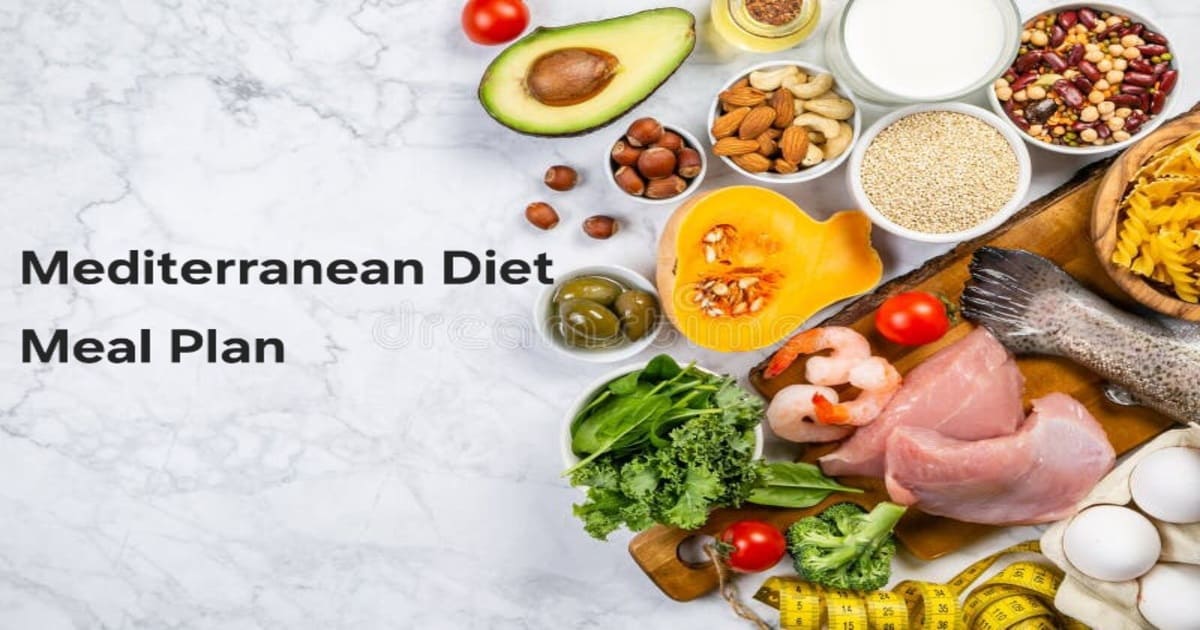Sometimes we hear the term “Mediterranean diet meal plan” and imagine it’s a complicated program that needs special ingredients or strict preparation but honestly, it’s way simpler than that. The whole idea isn’t about following a harsh diet or depriving yourself of the food you love, it’s about changing your relationship with food itself. This plan isn’t focused on counting calories or restriction, but rather on balance, variety, and natural eating. I personally tried following it for a while, and I noticed a clear difference in my energy throughout the day. Let me walk you through it step by step you might feel inspired to give it a try yourself.
The Main Idea Behind the Mediterranean Diet

The core of the Mediterranean diet meal plan is very simple: eat real food, and avoid the processed stuff. In other words, eat what you can actually recognize fresh vegetables, seasonal fruits, whole grains like oats or whole wheat, nuts, extra virgin olive oil, and fish rich in omega-3. All these foods work together to create balance in your body, reduce inflammation, and boost your mood.
It’s not just about what you eat, but also how you cook it. Mediterranean-style cooking is always simple no hydrogenated oils, no heavy sauces just natural herbs, spices, and healthy oils that give strong, rich flavors. That’s exactly why it’s perfect for anyone who cares about their health or does warm-up workouts your body gets all the nutrients it needs to perform well without overloading your digestive system.1
A Typical Day on the Mediterranean Diet Meal Plan

Let’s break down a typical day on this plan so you can see how it really works.
Breakfast:
Start your morning with something light but nourishing. Breakfast in easy Mediterranean diet meals usually combines protein, healthy fats, and complex carbs.
Try a bowl of plain Greek yogurt with a spoon of raw honey, a sprinkle of cinnamon, and a handful of nuts like walnuts or almonds. It’s the perfect pre-warm-up breakfast energizing but easy on the stomach.
If you prefer something savory, go for a slice of whole-grain toast topped with avocado and boiled eggs, plus a cup of green tea or light coffee. The goal of breakfast is steady energy not a sugar rush or caffeine overload.
Lunch:
Lunch is the main meal in this plan, usually packed with fiber and protein. A big colorful salad (lettuce, tomatoes, peppers, olives, cucumber, thyme, and extra virgin olive oil) with grilled chicken breast or a piece of fish is a great option.
If you like carbs, you can add brown rice, couscous, or whole-wheat pasta. The beauty of it is that you can change the ingredients daily, so you never get bored of healthy eating. And the best part? You’ll feel full for hours without needing too many snacks afterward.
Dinner:
Dinner here is usually light and easy on digestion. You can try lentil soup with whole-grain bread, a tuna salad with olive oil and lemon, or sautéed veggies with a sprinkle of feta cheese.
The idea is to let your body relax before sleep light, comforting meals that help you rest well. And if you work out in the evening, these kinds of dinners help you recover without feeling too heavy.
Read also: How to Choose the Best Pre Workout for Your Fitness Goals
The Link Between the Diet and Warm-Up Workouts

One thing most people don’t realize is that food plays a huge role in workout performance. A simple Mediterranean diet meal plan for weight loss keeps your body ready for physical activity because it gives you a perfect mix of complex carbs, healthy fats, and natural proteins.
If you do morning warm-ups like light jogging or stretching, a breakfast with Greek yogurt or nuts is the perfect fuel.
The Mediterranean diet is also packed with antioxidants, which help reduce muscle fatigue after workouts meaning you perform better and recover faster.
I still remember my first week on this diet I felt light, no sluggishness after meals, no bloating. My energy stayed steady, even after long work hours and exercise.2
7-Day Mediterranean Diet Plan

If you’re ready to start but don’t know where to begin, here’s a simple 7-day Mediterranean diet plan you can follow without stress or boredom:
- Monday: Oats with milk, honey, and nuts for breakfast; grilled fish with green salad for lunch; vegetable or lentil soup for dinner.
- Tuesday: Avocado toast and boiled eggs for breakfast; grilled chicken with brown rice for lunch; tuna salad for dinner.
- Wednesday: Go vegetarian sautéed veggies in olive oil for breakfast, hummus or beans with toast for lunch.
- Thursday: Pasta Mediterranean-style with olive oil, sun-dried tomatoes, and feta cheese; yogurt with fresh fruits for breakfast.
- Friday: Have fun homemade pizza with olive oil and roasted veggies; chickpea salad or tabbouleh for dinner.
- Saturday: Keep it light fruit breakfast, grilled fish or shrimp for lunch, warm soup for dinner.
- Sunday: Relax light breakfast with herbal tea, colorful salad for lunch, toast with white cheese and tomatoes for dinner.
The goal isn’t strict commitment, but finding comfort and balance in the lifestyle. After just one week, you’ll notice real changes more energy, better mood, and even improved sleep.
Tips to Stay Consistent Without Getting Bored

- The biggest challenge in any diet isn’t starting it’s staying consistent. That’s what separates the people who get results from those who quit after a few days. The Mediterranean diet meal plan has a huge advantage: it’s flexible and forgiving, but you still need a bit of creativity to keep it exciting.
- Be creative with your meals change ingredients often, try new vegetables or fish types. Don’t repeat the same meals every day; boredom is the real enemy. For example, switch tuna salad for chickpea salad with olive oil and lemon, or make pasta with spinach and olives instead of the regular one. Small changes keep it fun.
- Cook your meals yourself the smell, the preparation, and the tasting process make you feel more connected to what you eat. You don’t have to be a pro chef; even a simple olive-oil-based dish can feel rewarding.
- Don’t treat the Mediterranean diet like a strict rule make it your lifestyle. If you eat something off-plan one day, no problem. Just go back the next day. Your body doesn’t need perfection it needs consistency.
- Also, connect your diet to your movement. The Mediterranean way pairs perfectly with light walks or warm-up exercises after meals it helps with digestion and balance. Believe me, these little habits make a big difference.
- And finally be kind to yourself. Nobody changes overnight. But when you start caring about your body with genuine attention, everything shifts quietly your look, your energy, even your mood.
Read also: Weight Loss Shakes for Women Under 50
A Small Personal Experience
I still remember the first time I tried the easy Mediterranean diet meals I thought it would be difficult. But it turned out to be the opposite. The flavors made me want to continue. The olives, herbs, roasted veggies, and that fresh fish with lemon and olive oil all of it made me fall in love with this lifestyle. After two weeks, I was waking up full of energy, feeling lighter, and digesting food so much easier. And the best part? Even my workouts became more enjoyable because my energy was stable instead of up and down.
Final Thoughts
The Mediterranean diet meal plan isn’t just a way of eating it’s a lifestyle that blends health and pleasure in perfect balance. Combine it with daily warm-ups, and you’ll feel your body transform slowly but surely. Every meal carries a small message: “Take care of yourself, simply.” You don’t need fancy products or complicated rules. Just start with small steps one healthy meal, a bit of movement, enough water and with time, the change becomes a natural part of who you are.
Read also: best pre workout for women under 50
Reference











